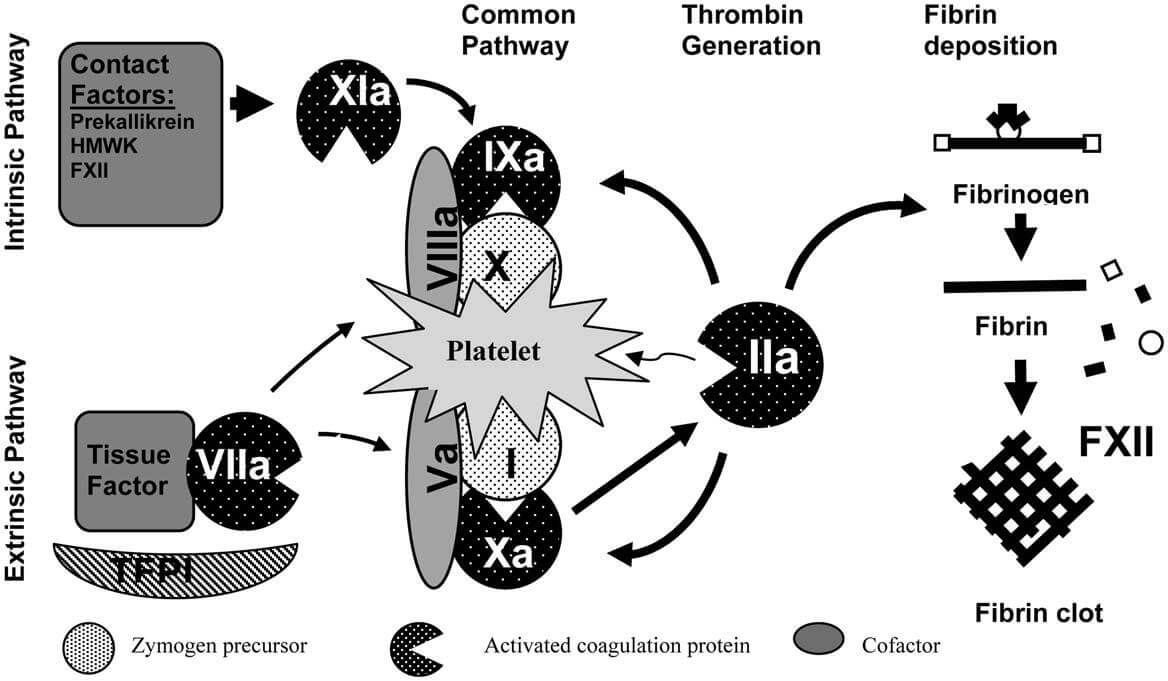| Catalog# | Product Name | Size | Price | Qty | Inquiry |
|---|---|---|---|---|---|
| THP-0311 | Vatreptacog alfa; rFVIIa | 1 vial | $3,298.00 |
|
Add to Cart Order |
Bleeding disorders are a group of diseases that result when blood fails to clot properly. Among them, congenital bleeding disorders are caused by a genetic defect or injury. They can be inherited or occur as a result of a genetic mutation and are present at the time of the patient's birth.
During normal clotting, platelets stick together and form an embolus at the site of the injured blood vessel. Proteins in the blood called clotting factors then interact to form a fibrin clot. It holds the platelets in place and allows healing to occur at the site of injury while preventing blood from escaping from the blood vessel. While too much clotting can lead to heart attacks and strokes, among other diseases. However, the inability to form clots is also very dangerous because it can lead to excessive bleeding.
 Figure 1. Coagulation pathways. (Brown, D., 2005)
Figure 1. Coagulation pathways. (Brown, D., 2005)
In patients with congenital bleeding disorders, the blood cannot clot properly because there are not enough clotting factors (fibrinogen, prothrombin, factor V, factor VII, factor X, factor XI, factor XIII, etc.). Therefore any cut or injury carries the risk of excessive bleeding. Patients with congenital bleeding disorders may present with a wide range of clinical signs, from the skin and mucosal bleeding to life-threatening bleeding. Examples include central nervous system (CNS), blood accumulation in joints, gastrointestinal bleeding, and recurrent miscarriages.
Vatreptacog alfa is a recombinant factor VIIa (rFVIIa) analog produced in CHO cell lines cultured in a serum-free medium. It shares 99% amino acid identity with natural FVIIa, with the only difference being three amino acid substitutions in the protease structural domain.
Vatreptacog alfa is designed to improve treatment by rapidly and consistently resolving bleeding events in patients with congenital bleeding disorders who use inhibitors. Previous trials have also demonstrated the safety and tolerability of vatreptacog alfa in patients with hemophilia with inhibitors. And vatreptacog alfa has also been shown to be effective in controlling all types of bleeding events, including joint, skin mucosa, muscle, soft tissue, and another bleeding. Researchers can improve the efficacy and incidence of vatreptacog alfa's hemostatic effects through rational and targeted protein modifications.
This all suggests that vatreptacog alfa has great potential to be used in the treatment of other congenital bleeding disorder types, not just hemophilia. Creative BioMart offers vatreptacog alfa to specialists in hematology and genetic disorders to improve the treatment of patients with congenital bleeding, including hemophilia. We do not only help you to improve your understanding of congenital bleeding disorders by providing high-quality products to refine existing therapies. We are also happy to assist you in making breakthroughs in the development of future therapies for congenital bleeding disorders. Please feel free to contact us to learn more about what we offer to our clients in reaching congenital bleeding disorders.
Reference:
For more information on how our products could help advance your project, please contact us.
ENTER YOUR EMAIL HERE TO SUBSCRIBE.
Copyright © 2026 Creative BioMart. All Rights Reserved.